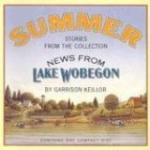“‘With steadfast daisies pure and white.’
But this is not all; this lovely, babbling brook fills a large pond, high up in the woods, then flows over a stone dam, and comes rushing down in a succession of waterfalls, stopping for breathing-space in one of the wildest story-telling glens I ever saw.
“And here, in the gloom of the forest-trees, where the birds love to congregate, and a thousand perfumes of clover and new-mown hay, and the aroma of the evergreen grove, come up, Ida and I spend many an hour, forgetful of city life, and heedless about ever returning to it.
“This year we are occupying the roadside house, which, although not so beautiful as the new one on the side-hill, nor so retired and romantic as the one in the woods still is lovely and has a very charming prospect. It stands on sloping ground that is skirted by forest and fruit trees. Some of them throw their grateful shade on the piazza and balcony that run the width of the front of the house. My room opens on the balcony by three French windows, and here I often walk to catch the last gleam of departing day, or linger after nightfall to see the far-away stars come out. The moonrise here is perfectly enchanting, climbing up as it does over the eastern hills, and throwing its pensive light over the silent meadows, and distant, dark woods.
“But I have filled my sheet before speaking of your engagement. As I have not seen your handsome doctor, you will not expect me to be enthusiastic. I hear that he is intelligent, clever in his profession, and of excellent character, but not rich. Well Evangeline, you know I approve of wealth, combined with other good qualifications; but if I had to choose between a man of mind and a man of money, I don’t think I would hesitate long which to take; so you are sure of my approbation, and you have my best wishes for your future happiness.
“Your loving cousin,
“MARGUERITE.”
June 29.
A visit yesterday from our friend Mrs. Sarah L. Hopper, the clever contributor to several Southern journals. Among them the Washington Gazette, and the True Woman—the latter an anti-suffrage journal. Mrs. Hopper not only writes well; she is also a woman of varied and excellent reading, and the appreciation of the modern classics is displayed in one of her poems—an admirable apostrophe to the character and works of Dante. This poem, which was published some time since, Mrs. Hopper once recited to us, and both mamma and I were struck with the true ring of poesy so apparent in it.
June 30.
Upon returning from church yesterday, we found the front door standing open, a couple of arm-chairs upon the piazza, and a newspaper or two in lieu of the occupants—proof unmistakable of a masculine invasion. Who it was we could not imagine; that it was not a neighbor we were convinced by seeing the morning Herald and Times, for the Sunday papers cannot be obtained here, save by being at the depot when the interminable way-train comes up from New York, and waylaying the newsboy who accompanies the cars; and for this our neighbors are rarely sufficiently enterprising. Unmistakably our visitors had come from the city.




